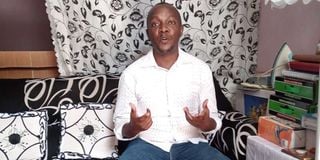Premium
It’s survival for the fittest as private schools' tutors face life without pay

What you need to know:
- Since receiving their full pay in March and half pay in April, they have been surviving by sheer luck.
- Every morning, the four sit down to discuss how to raise money for food and other needs.
- On some days, the two men go out to look for menial jobs.
For the third month now, Mr Moses Maliatso and his wife Daisy Ebosso, who have two children, have had to share their one-room house in Githurai, Nairobi, with Ms Maureen Ojilong and Mr Michael Wanaoni.
The four aren’t related.
They are simply teachers in different private primary schools in the city, united only by their common fate: loss of income after the government ordered all schools closed in March due to the Covid-19, outbreak.
Since receiving their full pay in March and half pay in April, they have been surviving by sheer luck.
UNABLE TO FEND FOR HIMSELF
Whereas he could pay his bills and even support his five siblings back at home when he was working, Mr Wanaoni is now unable to fend for himself. Both he and Ms Ojilong were kicked out by their landlords due to rent arrears.
Now they can’t access any of their belongings.
Every morning, the four sit down to discuss how to raise money for food and other needs.
On some days, the two men go out to look for menial jobs.
‘‘These jobs have become scarce. There are so many desperate people looking for work,’’ Mr Maliatso said.
TURNED AWAY
Mr Wanaoni tried to register for the Kazi Mtaani programme in June but was turned away because he is a teacher.
To provide for her family, Ms Ebosso was offering home tuition to some of her learners.
But when the government announced that schools wouldn’t resume until next year, parents withdrew their children.
That schools will reopen in 2021, which means they have another five months without work, is giving the four teachers nightmares.
Ms Ojilong is unsure whether to go back to her family home in Vihiga County or to stay in the city.
“If I stay, what will I be doing? How can I start to depend on my parents after they invested in my education? I should be supporting them,” she said, her voice breaking.
PERCEPTION MISGUIDED
To many Kenyans, private schools are financially endowed centres where wealthy parents take their children.
But Mr Wanaoni said this perception is misguided, noting that some of these schools grapple with multiple challenges.
“Many private schools offer education at low cost in areas where there are no public schools, including in the slums,” he said, adding that many such schools don’t even have the infrastructure to conduct online classes.
Should any of them fall sick, they’re afraid they might not get medical services after they stopped paying their NHIF premiums for lack of income.
SAVINGS EXHAUSTED
Meanwhile, Mr Maliatso and his wife have exhausted their savings, their generosity tried to its limit.
‘‘I’m scared about the future. I’m not sure how we’ll get by,’’ Ms Ebosso said.
Their efforts to get help from Nairobi Governor Mike Sonko and Woman Rep Esther Passaris yielded nothing.
Their hope of survival now lies squarely in the hands of well-wishers.





